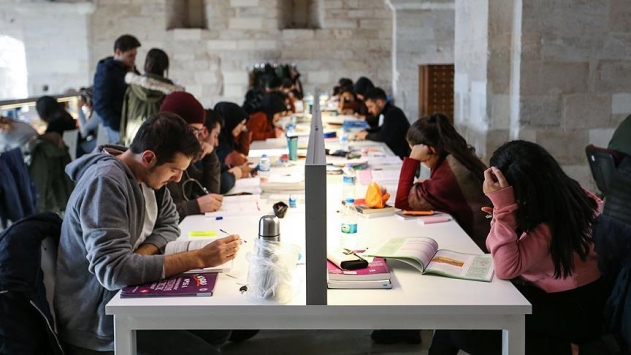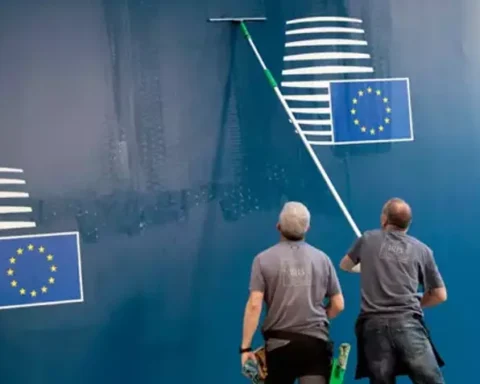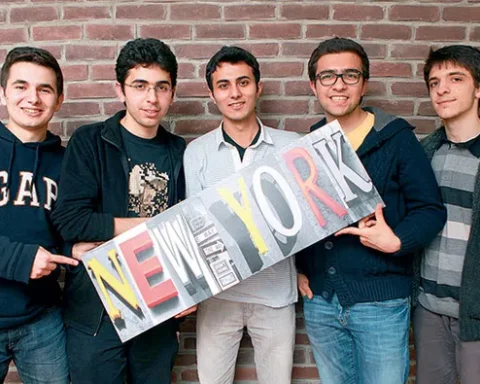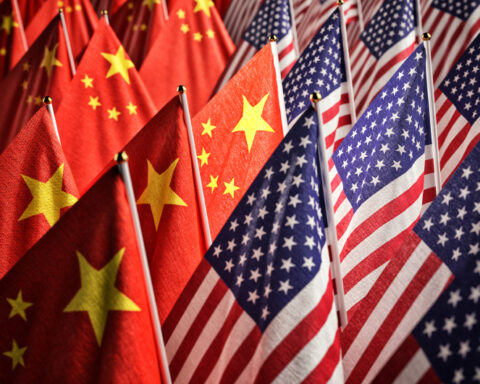It’s time to get serious again.
As a professor, I go to a lot of academic events. It is rare that I see displays of physical prowess at any of these. But recently, that’s what I encountered.
A couple of weeks ago, I attended a talk at my home institution of Princeton University. During the Q&A, I was called on. As is typical for lectures that are being taped, questioners were to speak into microphones. But when the microphone arrived, I was not allowed to hold it. This was new to me. The staff member told me that it was now policy not to allow attendees to hold the mic while they spoke. Because of where I was sitting, the poor guy had to contort himself — arm raised at a difficult angle, body awkwardly twisted — for some time in order to maintain the mic in front of my face while I pontificated leisurely. It was quite distracting, even demeaning, to be denied the ability to hold the mic while I spoke. At least the mic-holder got a workout. What could account for this?
As it turns out, the new mic rule had come from the dean’s office. It appears that, in the wake of an embarrassing recent disruption of a speech by an Israeli politician on campus, and with the Trump administration on the prowl for any snafus that can be used to buttress their assault on colleges, the Princeton administration had decided that it was too risky to let speakers hold their own microphones while talking. The fear, I suppose, was that if speakers could hold their own mics and they decided to be disruptive or say embarrassing things, it would be too difficult to stop them. That it looked silly and made speakers feel stupid was surely a price worth paying to avoid another scene that might go public. Ironically, the subject of the event was the declining reputation of higher education with the public.
Given the litany of challenges that Trump II is presenting for colleges, it might seem that something like this is too trivial to notice. But I don’t think that’s right. Indeed, that this kind of thing has become common has helped enable Trump’s unprecedented attacks on higher education. My undignified experience was a symbol of the broader fact that colleges have become less serious places. They are losing the capacity for common sense. Treating students like helpless children has been a well-observed and pervasive trend. But the instinct to manage and meddle extends well beyond those to whom the college is supposed to stand in loco parentis.
Think of the implicit message of refusing to let an attendee hold the mic. The audience for this particular talk consisted of faculty, students, and alumni, many of the latter of whom I was given to understand were donors. Princeton thinks I’m fit to teach students and conduct research … but not to hold a microphone? Princeton tells its students that they will go on to be world leaders … but they are not to be trusted with this potential instrument of unruliness? Princeton does not hesitate to raise considerable sums of money from alums but evidently thinks it really would be taking a risk if it allowed them to talk normally, without this sort of overbearing supervision.
This attitude is typical across college life. Instead of responding to the root of problems in a direct and forthright manner, one finds instead an indulgence in managerial infantilization. To give another humdrum example: A senior colleague of mine was recently moderating a panel that was disrupted, though in a less spectacular way than other recent fiascos. But this distinguished professor was not permitted to notify the misbehaving folks that they were violating the university’s rules and that, if they did not desist, public safety would be entitled to remove them. She was forbidden to take any action. Only a certified “free speech facilitator” could administer the warnings. As a result, the panelists all had to twiddle their thumbs until a representative of this special category of dignitaries could arrive from somewhere across campus — a process that was itself a punishment to the panel’s nondisruptive attendees.
The modern university routinely fails to convey that it is an academic organization above all, and that study, research, and informed debate are a serious business that require devotion, attention, and maturity. Rather, it treats its students and increasingly its faculty and staff like children whose manners are to be improved, whose feelings are to be massaged and regulated. Instead of simply making clear rules against disruption and leaving it at that, colleges wind up with ever more senseless protocols and ever more useless offices to oversee and guide us through disagreement.
Indeed, apart from the demographic and ideological gerrymandering of applicant pools, a principal effect of the explosion of diversity, equity, and inclusion apparatuses over the last decade has been to suggest that inevitable occurrences of discomfort and offense require robust bureaucratic superintendence. Instead of simply enforcing the rules against drug use or hazing, it declares total war on spontaneous sociability; at Stanford, for instance, a sprawling set of regulations of social and residential life were summed up by critics as a “war on fun.” At a sporting event, disruption is not tolerated. If you run on the field, you will be ejected from the stadium, and you might be criminally charged. Personally, I think learning and reasoned discussion are more important than sports, and I would like to see our activities treated at least as seriously as a soccer game.
The impulse to control extends to every aspect of life. A half-dozen years ago, Princeton passed a new rule barring any romantic relationships between faculty members and grad students, even if they have nothing to do with each other professionally. To be clear, Princeton already had all the normal and appropriate regulations: an absolute prohibition on relationships between faculty and undergraduates; a ban on dating any graduate students that one advised or that were in one’s own or related fields; stringent rules against quid pro quo and harassment and abuse of position. But it was still possible that a 31-year-old assistant professor of English and a 36-year-old doctoral student in physics might fall for one another, and in the #MeToo period, I suppose it seemed trendy to get ahead of the curve and treat an ever-wider swath of behavior between adults as falling within the university’s purview. At the time, administrators boasted of being in the moral vanguard, of being among the first academic institutions to exert such broad authority over their adult employees. Fortunately for single academics everywhere, most colleges have not followed Princeton’s lead in this specific area. But the impulse to intrude ever more persists.
Instead of micromanaging personal relationships and social gatherings, instead of imposing a baroque etiquette via bias-response teams and trigger warnings (which do not work anyway), the university could state forthrightly to students and faculty members that it is not its business to protect them from disagreement or offense. Instead of canceling classes or announcing therapeutic services when an election or social event goes differently than the majority of college denizens would have liked, the university could insist that that the value of science and discovery and research are not contingent on the way the political winds are blowing. The walls of campus buildings are adorned with posters that suggest that the normal experience of being a student should be one of feeling depressed, alienated, overwhelmed, marginalized. For institutions that groan on endlessly about privilege, they do not convey the message they should on this front: All of us at a modern college are extremely fortunate, and with that good fortune comes a duty to exert yourself and to respect common-sense rules.
There is the old saw about the man who is so open-minded that his brains fall out. The modern university has a parallel problem: It is so enamored of a kind of therapeutic inclusivity that it has in fact become invasive and demeaning. The end result of all this is to suggest that its people and purposes are quite trivial.
Early signs are that the rise of artificial intelligence is going to exacerbate this problem of intrusion under the guise of best practices and emotional management. A celebrated historian noted recently that the AI attached to the Harvard email system now suggests that one alter one’s tone should it seem (according to the algorithm) too confrontational or insulting. If current trends hold, the future predicted by a colleague of mine seems inevitable. “I am apprehensive,” he told me, “that as AI becomes deployed in more contexts in universities, it will become a kind of all-knowing student-services manager, monitoring rather than just passively being available. I can see AI becoming an all-purpose Jeeves, by turns the student’s nanny and the administration’s spy, gently correcting ‘improper’ lines of inquiry and reporting on those that are, shall we say, reportable. Of course, this will not be limited to students.”
Given how feeble colleges have been when it comes to addressing the ways that new technology is eroding the educational environment, the continued expansion of this kind of meddling and discipline that presents itself as merely ideologically neutral sensitivity or best practices for keeping everyone safe and happy seems an inevitability. Faced with the opaque and overactive mental-health apparatus at colleges, many professors regularly encounter defeat on minor matters. For instance, several of my colleagues have had the frustrating experience of being unable to make their classrooms device-free. Once they announce this policy in their class, they receive countless notes from the student-life and accommodations apparatus informing them that such-and-such student needs his computer — an instruction which the people who actually do the teaching have no choice but to accept.
Given that the programming coming out of teaching centers almost always suggests that how students feel in the classroom is far more important than whether they are actually learning anything, it seems unlikely that any of the very real educational challenges confronting colleges will be met with sufficient seriousness. At a time when not only the White House but a broad section of the public has grown wary of higher ed, it is imperative that colleges display a serious face in everything they do. They can begin by treating their students and employees like adults. Instead, we’ll probably see many more versions of the officious mic-runner spreading across every area of campus life.
* Gregory Conti is an associate professor of politics at Princeton University.
Source: https://www.chronicle.com/article/colleges-must-stop-infantilizing-everyone






